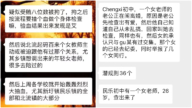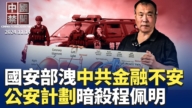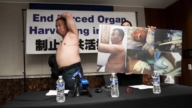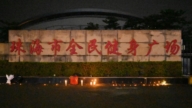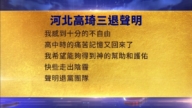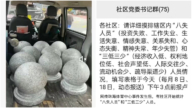【新唐人2013年12月13日訊】歲末年終,英國《金融時報》中文網推出2013中國年度報告,並邀請一些意見領袖針對中國過去一年的重大議題提出看法和討論。對於中國下一步的變革,北京大學經濟學教授提出「改革必須走出理念陷阱」。下面一起去了解。
北京大學經濟學教授張維迎提到,中國存在「六大錯誤的理念陷阱」,而這些理念陷阱嚴重的阻礙著中國的進步。
他舉出的第一個錯誤理念是「中國模式論」。他認為,現在中國的經濟是建立在資本主義自由理念的基礎上,「中國人在用電腦、手機,在開汽車,在上網路,這些都是自由體制下創造的,不是非自由體制創造的。」他表示:「中國模式論」是一個非常錯誤的理念。
第二,有人認為中國過去30多年的經驗證明,政治體制不改革,經濟體制照樣可以市場化,經濟仍然可以高增長。而張維迎認為「這個時代已經過去了」。他在文章中闡述「人需要尊嚴,需要自由,包括言論自由、思想自由、宗教信仰自由的權利,如果始終不承認個人的天賦權利,那任何統治的正當性都會受到懷疑。」
美國南卡羅萊納大學艾肯商學院教授謝田:「我想張維迎這個觀點,可能反映了中國知識界的一個很普遍的困惑現象,就是說,事實上中國知識界很多人都認識到了中共是中國問題的核心。」
第三個錯誤的理念陷阱則是「多人認為現行體制對既得利益者好」。看看那麼多既得利益集團出事了,包括北大畢業的薄熙來,假如不是這樣的體制,他能落到這樣的下場嗎?所以既得利益者不要被眼前利益遮住了雙眼,一定要認識到:有人權比有特權好。有特權保證你在位時可以得到別人得不到的東西,沒有人權意味著隨時處在高度不安全中。
獨立評論員張健:「有一句話叫做『春江水暖鴨先知』,看一看中國所有的貪官,所有掌握中國國有資產的這些人,他們把自己所有的人,為甚麼揹負著『裸官』的名義,也把自己的子女弄到國外來,這就是給中國的經濟和政治給出一個強烈的信號,中國已經是風雨飄搖之中。」
張維迎提出的第四個「理念陷阱」就是「國有企業是共產黨執政的基礎」。而事實卻是「改革開放發展了私有企業,解放了生產力」共產黨才維持著政權。張維迎看中國的國有企業,目前已經變成了「負資產」,因為國企的低效率,降低了人民的生活和政府的財力,它們導致的不公平、腐敗和道德墮落,引起了人們的強烈不滿。
第五,「槍桿子裏出政權」的理念錯誤。張維迎表示,當人們認為某一種政權的合法性或者正當性已經喪失的時候,這種政權有再多的槍桿子也沒法維持,因為槍桿子會跟著理念走。
而存在中國的第六個理念陷阱則是「政府的權力越大,政府越強大」。他說,人治的政府看起來強大,其實很脆弱,至少從長期看是這樣,因為它得不到老百姓的真正信任。
謝田:「中國需要知識份子站出來振臂一呼,引領全社會向解體中共、恢復自由的方向發展。我想張維迎他的文章,或者報導中所提到的理念問題,實際上就是徹底的清除共產黨文化。」
張健:「中國政治改革和體制改革,一直是走的雙峰制,而且是越行越遠,在這樣的一個過程當中,政治改革成了死胡同。無論習、李做了甚麼,他不能改變共產黨本質的一種殘暴和一黨獨裁的特性。如果這個特性改變不了的話,中國的政治改革必然無望。」
張維迎去年已提出「腐敗可能亡黨,不可能亡國」的看法。他強調,改革要取得成功,就必須還政於民。
採訪/陳漢 編輯/黃億美 後製/鍾元
Economist: Six Wrong Concepts Hinder China’s Reform
In the ‘2013 Annual China Report’ published by the Chinese
version of Financial Times, a number of scholars and experts in
economy and politics addressed their opinions about
China issues in 2013.
One Beijing University economist says that reform must
transcend conceptual pitfalls.
The following is our report.
Zhang Weiying is a professor of Economics at
Beijing University.
He says six wrong concepts have China trapped
and seriously impede China’s progress.
The first wrong concept is the “China Model."
Mr. Zhang says China’s current economy takes advantage of
what’s developed on the basis of capitalistic freedoms.
“The Chinese are using the computers, mobile phones,
vehicles, and Internet, the products of free social system.
They are not created by the non-free society."
He added: “The China model” is very much a misconception.
The second error is that some people say experiences over
the past 30 years have proved that without political reform,
China’s market-oriented economy has continued to grow.
Mr. Zhang says that “the time has passed."
He explains: “Human beings need dignity and freedom,
including freedom of speech, freedom of thought,
and the rights and freedom to spiritual belief.
Without recognizing individuals’ natural and legal rights,
the legitimacy of any ruling power will be challenged."
Xie Tian, professor of School of Business at University of
South Carolina Aiken: " Zhang Weiying’s view reflects a
very common debate among Chinese intellectuals.
That is, many of them have recognized that
the CCP is the core of China’s problems."
The third error is that many people believe that the vested
interest groups are taking advantage of the current system.
Mr. Zhang says many such vested interest groups have fallen.
Bo Xilai, a Peking University graduate, would not have had
such a fate if it weren’t for such a system.
He says the vested interest groups should not be blinded
by the immediate interests.
They should recognize: Human rights are better than
the privileged rights.
The privileged rights may ensure interests temporarily, but
without human rights, it also signals insecurity at any time.
Zhang Jian, commentator: “There is a saying, ‘When the river
flows warm in spring, the ducks are the first to know.’
Look at those corrupt officials who own the state’s assets.
They’d rather carry a name of being a ‘naked official’,
they sent their children overseas.
That is a very strong signal about the economy and politics
in China. It is very precarious."
The fourth wrong concept Zhang Weiying proposes is that
state-owned enterprises are the foundation of the CCP ruling.
He says the fact is that, “Private enterprises have
developed because of the reform and opening up,
and thus the productivity was created," and that is how
the Communist regime was maintained.
As Mr. Zhang sees it, China’s state-owned enterprises have
become negative equity for its low efficiency, which has
damaged the livelihood and the financial capacity of the state.
They have created unfairness, corruption and moral depravity,
and have aroused strong dissatisfaction from the people.
The fifth trap is the notion that, “Political power grows out of
the barrel of a gun." Mr. Zhang says that when a regime
has lost its ruling legitimacy or legality, the numbers of
the guns will not help, because the guns will follow the ideas.
The sixth trap is the belief of “the more power the government
hold, the stronger it is."
Mr. Zhang says the man-ruled government looks strong,
but in fact is very fragile, at least in the long run,
because it will not get the people’s full trust.
Xie Tian: “The Chinese intellectuals should stand up and
lead the society to disintegrate the CCP, and to freedom.
I think Zhang Weiying’s article and the concepts he mentioned
relate to the issue of completely cleaning out the CCP culture."
Zhang Jian: “China’s political and institutional reform
have been taking separate paths.
Consequently, they are going farther away from one another.
The political reform is going towards a dead end.
Anything Xi and Li do will not change the brutal dictatorship
and one-party nature of the Communism.
If this characteristic isn’t changed,
then China has no hope of political reform."
Zhang Weiying had brought up his opinion last year that,
“Corruption may collapse the Party, but not China.”
He emphasized that the success of reform
requires returning governing to the people.


